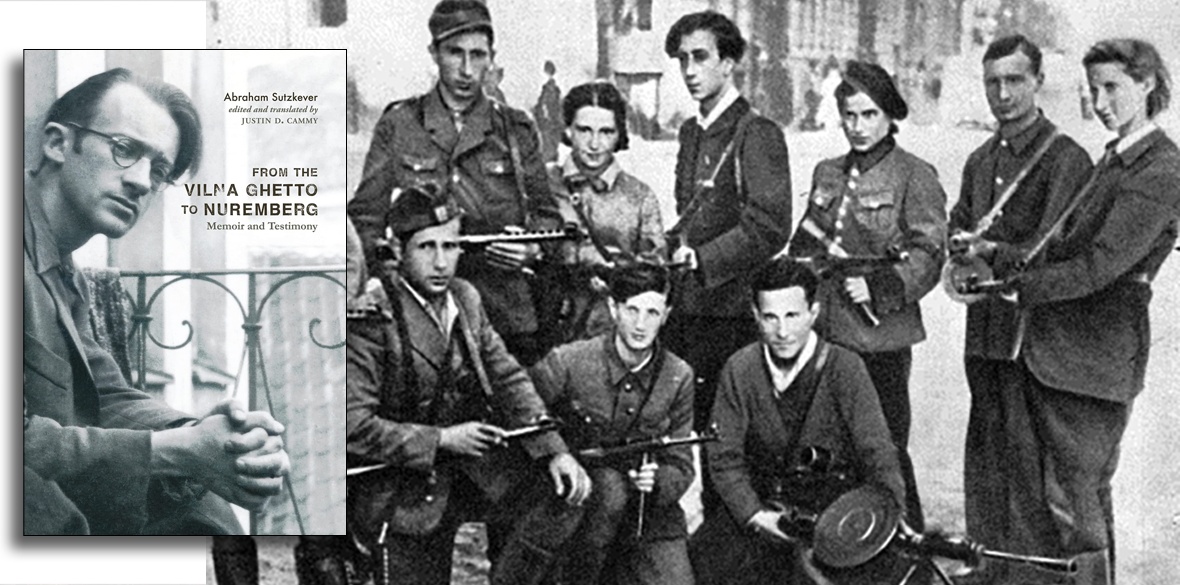This is the last article you can read this month
You can read more article this month
You can read more articles this month
Sorry your limit is up for this month
Reset on:
Please help support the Morning Star by subscribing here
From the Vilna Ghetto to Nuremberg – Memoir and Testimony
by Abraham Sutzkever
McGill-Queen’s University Press £28.50
ABRAHAM SUTZKEVER was born in 1913 to a leather dealer and raised in the rich cultural heritage of Lithuanian Jews with Vilna (Vilnius) at its core, a city of Poles, Jews, Belorussians, Lithuanians and Russians.
By the 1930s Vilna was highly regarded as a centre for secular Yiddish culture, boasting five daily Yiddish newspapers, a Yiddish education system and a research institute for the study of eastern European Jewish history and culture.
Sutzkever became a celebrated poet in international Yiddish circles, writing lyrically about beauty and nature with little interest in exploring social and political themes.
This was all to change with Operation Barbarossa, the German invasion of the Soviet Union. Vilna fell to the Nazis in June 1941 and for the next two years the Jews of the city were subjected to the horror of life and death in the ghetto.
Overnight Sutzkever became an activist, organising secret cultural events and youth clubs, and rescuing important texts and artefacts from Nazi destruction.
In 1942 The United Partisan Organisation was established in the ghetto, led by Itzik Vitenberg and other communists. Sutzkever joined and was now smuggling in weapons and writing poems such as Take up Arms! about the reality of the times.
Although Sutzkever was not of the left he acknowledged and appreciated the role played by communists and socialists in the resistance. Having escaped from the ghetto with his wife in 1943 he spent six months hiding with other partisans in the forest before the Soviet Jewish Anti-Fascist Committee arranged for his rescue. The Soviet Union mounted two rescue missions to airlift him to safety in Moscow.
Sutzkever was one of the five Soviet witnesses to speak at the post-war Nuremberg Trials and the full account of his testimony is contained in this book, which also includes his memoir From the Vilna Ghetto, first published in Moscow and Paris in 1946 and now appearing for the first time in English.
Sutzkever’s aim was to indict the perpetrators of war crimes and to give an account of the horrific conditions under Nazi rule, plus the resilience and inventiveness shown by its victims in resisting tyranny.
His account is chronological and detailed, covering every aspect of life within the ghetto and the slave labour camps outside its gates. He synthesises his individual recollections with those of others in order to build a picture of collective experience. Sutzkever eschews emotion; this is a factual reportage of the almost complete extermination of Jewish Vilna. By the time the city was liberated by the Red Army there were 600 Jews left from a pre-war population of around 80,000.
His measured, almost dry style only adds to the shock of reading such harrowing material — for example, the murder of his new-born child in front of his wife’s eyes (no babies were allowed to be born in the ghetto) and the nine-year-old boy’s account of watching his parents killed by fellow Jews because his mother’s screaming panic was jeopardising an escape attempt.
The translator Justin D Cammy has provided a lengthy afterword to place Sutzkever’s writing into context. However, Cammy’s palpable distaste for the USSR will jar with those who hold a more positive view of the Soviet Union’s role during the war.
Sutzkever’s narrative of horror and heroism speaks for itself and Cammy’s interpretations of it are something of a distraction and a detraction.
In 1947 Sutzkever chose to leave Moscow and emigrated to Mandate Palestine, where he believed Yiddish culture would have the best chance of survival. He was a modest, unassuming man who lived through tumultuous times, having the courage to actively resist tyranny as well as possessing the talent to write about these experiences. His ability to steer a course both physically and intellectually through a dangerous and fluid time in history is remarkable.












